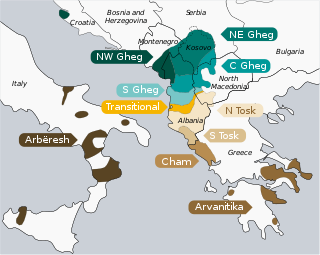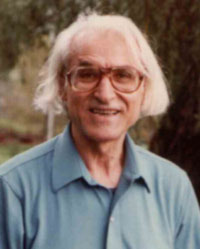Related Research Articles

Albanian culture or the culture of Albanians is a term that embodies the artistic, culinary, literary, musical, political and social elements that are representative of Albanians. Albanian culture has been considerably shaped by the geography and history of Albania, Kosovo, parts of Montenegro, parts of North Macedonia, and parts of Northern Greece, traditional homeland of Albanians. It grew from that of the Paleo-Balkan cultures, including Proto-Albanian, Illyrian, Thracian, Dacian, with their pagan beliefs and specific way of life in the wooded areas of far Southern Europe. Albanian culture has also been influenced by the Ancient Greeks, Romans, Byzantines and Ottomans.

Musine Kokalari was an Albanian prose writer and politician in Albania's pre-communist period. She was the founder of the Social-Democratic Party of Albania in 1943. Kokalari was one of the first published female writers of Albania. After a short involvement in politics during World War II, she was persecuted by the communist regime in Albania, and not allowed to write anymore. She died in poverty and complete isolation.

Gjon Buzuku was an Albanian Catholic priest who wrote the first known printed book in Albanian. Commonly referred to as the Missal, this book is considered an important monument of Albanian studies, being the oldest source for studying the Albanian language.

The music of Albania is associated with the country of Albania and Albanian communities. Music has a long tradition in the country and is known for its regional diversity, from the Ghegs in the North to the Tosks in the South. It is an integral part of the national identity, strongly influenced by the country's long and turbulent history, which forced Albanians to protect their culture from their overlords by living in rural and remote mountains.

Prende or Premte is the goddess of dawn, love, beauty, fertility, health and protector of women, in the Albanian pagan mythology. She is also called Afër-dita, an Albanian phrase meaning "near day", "the day is near", or "dawn", in association with the cult of the planet Venus, the morning and evening star. Her sacred day is Friday, named in Albanian after her: e premte, premtja. In Albanian mythology Prende appears as the daughter of Zojz, the Albanian sky and lighning god.

Proto-Albanian is the unattested language from which Albanian later developed. Albanian evolved from an ancient Paleo-Balkan language, traditionally thought to be Illyrian, or otherwise a totally unattested Balkan Indo-European language that was closely related to Illyrian and Messapic, which is sometimes also referred to as Albanoid.

Albanian is an Indo-European language and an independent branch of that language family. It is the descendant of a Paleo-Balkan language. Albanian is the official language of Albania and Kosovo, and a co-official language in North Macedonia and Montenegro, as well as a recognized minority language of Italy, Croatia, Romania and Serbia. It is also spoken in Greece and by the Albanian diaspora, which is generally concentrated in the Americas, Europe and Oceania. With perhaps as many as 7.5 million speakers, it comprises an independent branch within the Indo-European languages and is not closely related to any other modern language.
The Ghegs are one of two major dialectal subgroups of Albanians They are also differentiated by minor cultural, dialectal, social and religious characteristics. The Ghegs live in Albania, Kosovo, North Macedonia, Serbia and Montenegro. The Ghegs speak Gheg Albanian, one of the two main dialects of Albanian language. The social organization of the Ghegs was traditionally tribal, with several distinct tribal groups of Ghegs.
Tosks are one of two major dialectal subgroups of Albanians differentiated by their cultural, linguistic, social and religious characteristics.

Kostandin Nelko, known as Kostandin Kristoforidhi, was an Albanian translator and scholar. He is mostly known for having translated the New Testament into Albanian for the first time in the Gheg Albanian dialect in 1872. He also provided a translation in Tosk Albanian in 1879 thereby improving the 1823 tosk version of Vangjel Meksi. By providing translation in both dialects, he has the merit of founding the basis of the unification of both dialects into a national language.

Zef Jubani or Giuseppe Jubany in Italian was an Albanian folklorist and activist of the Albanian National Awakening. He is known for the publication of a Collection of Albanian Folk Songs and Rhapsodies in the Gheg Albanian dialect. Jubani advocated the creation of a unique alphabet of the Albanian language. For his political activities, which often were anti-clericalist, Jubani was denounced to the Holy See by the Jesuit missionaries of Shkodër.

Albanian epic poetry is a form of epic poetry created by the Albanian people. It consists of a longstanding oral tradition still very much alive. A good number of Albanian epic singers can be found today in Kosovo and northern Albania, and some also in Montenegro. The Albanian traditional singing of epic verse from memory is one of the last survival of its kind in modern Europe.

Arshi Pipa was an Albanian-American philosopher, writer, poet and literary critic.
The literature of Kosovo is composed of literary texts written in Albanian, Serbian, Bosnian, and Turkish, specifically by authors of Kosovo. Kosovo produced several prominent writers in the Ottoman era. However, Ottoman authorities banned the written use of the Albanian language until 1912. This policy continued during Serb rule until the outbreak of World War II.

Risto Siliqi was an Albanian poet, publicist, lawyer, and militant of the Albanian national cause. His work was influenced by ideas and sentiments of the Romantic-Nationalism like other poets of the national Awakening before him.

The Albanian Literary Commission, also known as the Literary Commission of Shkodër, was a scholarly committee established in Shkodër, north Albania in 1916. It gathered major personalities of Albanian literature and writing of the time, and was formed with the aim of defining a fixed literary standard and orthographic rules for the Albanian language which were lacking at the time, in order to encourage the publication of schooltexts.

The Arbanasi dialect is a dialect of Gheg Albanian that is spoken in long-standing diaspora communities of Albanians in Croatia. Its speakers originated from the region of Kraja, and moved to Croatia in the early 18th century.

Faik Bey Konica was an important figure in Albanian language and culture in the early decades of the twentieth century. Prewar Albanian minister to Washington, his literary review Albania became the focal publication of Albanian writers living abroad. Faik Konica wrote little in the way of literature, but he was an influential stylist, critic, publicist and political figure in Albanian culture.

Ag Apolloni is an Albanian writer, poet, playwright, scholar, and essayist. He is a professor at the University of Prishtina. His literary works are distinguished for their dramatic dimension, philosophical treatment, and critical attitude towards history, politics, and society.

The Jesuits in Albania refers to the Jesuits and Jesuit missions in Albania.
References
- 1 2 3 4 5 6 "Ledia Dushi Biography". Albanian Literature. Retrieved 2021-03-17.
- 1 2 3 4 5 6 7 8 "Ledia Dushi – What Comes From the Waters". Live Encounters. March 2020. Retrieved 2021-03-17.
- 1 2 "Ledia Dushi". Instituti i Antropologjisë Kulturore dhe i Studimit të Artit (in Albanian). Retrieved 2021-03-18.
- ↑ "ALBANIAN (Shqip)". Center for Second Language Studies. Retrieved 2021-03-18.
- ↑ Stieger, Cyrill (December 2016). "Einführung". Orte (in German). 189.
- ↑ Velaj, Alisa (2020-10-26). "Ledia Dushi, poete elitare - e ndryshme nga 'aradha e Sibilave'". ObserverKult (in Albanian). Retrieved 2021-03-18.
- ↑ "Ledia Dushi (Albania)". Atunis Galaxy Poetry. 2020-11-01. Retrieved 2021-03-18.
- ↑ Krasniqi, Gazmend (2017-11-26). "POETI I DITËS – Ledia DUSHI". Palimpsest. Retrieved 2021-03-18.